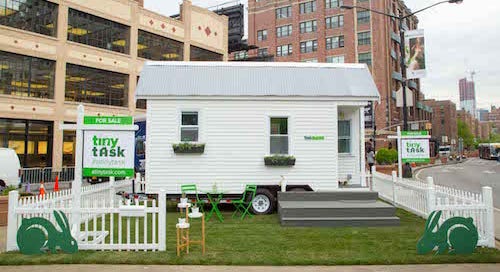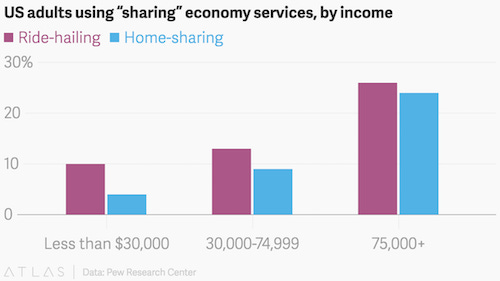Here is a photo of the Tiny House that TaskRabbit built in Manhattan’s Chelsea neighborhood in 72 hours last week. I dropped by once it was finished on Thursday (May 19) and have to say, it was pretty cool. It had a tiny living room, a tiny bathroom, a tiny ladder leading up to a lofted bed, and a kitchen that, by New York standards, could definitely have been tinier.
The 11%.
Back when I was contemplating starting this newsletter, I was weighing a couple different names, most of which were very bad, until my editor suggested Oversharing, and the rest is history. Oversharing, obviously, is a riff on “sharing” economy, but some of my other ideas played instead off of “gig” economy. Anyway, I am very glad I did not use any of those, because according to a report released last week by Pew Research Center, just 11% of US adults have heard of the “gig” terminology. That’s compared to 27% who know “sharing economy”—still not great, but certainly better.
Other findings from Pew’s report, its very first on the whatever-you-call-it economy:
72% of Americans have used some type of shared or on-demand online service
But only 10% of US adults with household earnings below $30,000 have used ride-hailing, and nearly 50% of them haven’t heard of it
Similarly, a mere 4% of Americans in that income bracket have rented rooms on home-sharing platforms like Airbnb, while 69% aren’t familiar with them
In other words, the sharing economy isn’t for everyone—overwhelmingly, it belongs to the wealthy and well-educated.
Promises and dangers.
The gig economy has been marching steadily toward Washington, and last week it arrived with a flourish via an Elizabeth Warren speech. Warren talked about “the promise of these new businesses—and the dangers,” but really, mostly the dangers. Warren is worried that companies like Uber and Lyft are convincing workers to trade increased flexibility for “extremely low wages.” She wonders whether the gig economy “is simply the next step in a losing effort to build some economic security in a world where all the benefits are floating to the top 10%.” She wants America to reinforce its safety nets, such that all workers have Social Security, catastrophic insurance, and earned leave, as well as portable health care and retirement benefits.
Warren’s speech is probably the most prominent policy mention of the new digital economy since Hillary Clinton touched on it briefly in her economic address last summer. That’s not to say the discussion isn’t happening at the federal level, but it’s been happening quietly and slowly. There is a Sharing Economy Caucus that holds periodic events (one happened this morning), and of course the requisite lobbying. Talk to people in DC, though, and they’ll tell you that right now the first goal is education. Just as not all Americans know of these companies and the changes they’re stirring in the workforce, neither do all of the players in Washington.
Gregory, Jessie, Todd.
Airbnb is being sued by Gregory Selden, a 25-year-old black man, for racial discrimination. In the complaint, filed last week in the US District Court for the District of Columbia, Selden alleges that he was discriminated against while attempting to book a room on Airbnb in Philadelphia in March 2015. Selden says he inquired about a listing and was told by the host that it was not available. But, later that day, Selden saw the same space listed as available on Airbnb. As an experiment, Selden made two fake profiles that were similar to him, except that they featured white men. “Jessie” and “Todd” were both immediately accepted by the Airbnb host. The complaint further alleges that when Selden contacted Airbnb about suspected discrimination, the company never responded.
This isn’t the first time that Airbnb has run into problems with discrimination. Last fall, people in Georgia called the cops on a group of young black men who were renting their neighbor’s house, assuming that the visitors had broken in. Meanwhile, a working paper by three researchers at Harvard found “widespread discrimination” by hosts against people with black-sounding names. Airbnb, for its part, says it takes this issue “incredibly seriously,” but seems somewhat at a loss for a solution. The company says it’s made “unconscious bias training” available to 5,000-some hosts (there are more than 2 million listings on the site) and is working to increase its focus on reviews. “We don’t have all the answers,” Airbnb diversity director David King writes. “We will continue to work as hard as we can to break down barriers and bring people together.”
Psych.
Here is a fun interview that Keith Chen, behavioral economist at UCLA and head of economic research at Uber, did with NPR’s Hidden Brain podcast last week. It’s full of interesting tidbits about the psychology of surge pricing—for example, that people are more likely to take Uber at 2.1x surge than 2.0x. The reasoning for this, per Chen, is that the round 2.0 number can feel like Uber “must have seen it was raining and just decided to mess with me” whereas the specific 2.1 seems like “wow, you know, there must be some smart algorithm in the background.” People are awesome at math! Also, you’re more likely to call an Uber regardless of price when your phone is about to die.
Other stuff.
Instacart’s CEO thinks the on-demand skepticism “is healthy.” Peter Thiel, hater of college, gives a commencement address. Self-driving trucks may beat self-driving cars. Uber’s self-driving cars are on the road. Uber-Parkmerced is a “first-of-its-kind partnership to bridge people to car-free living.” GM’s Maven expands. Lyft tests scheduled rides. Austin scrambles to replace Uber, Lyft. Life after Uber, Lyft. Theranos bloodbath. HelloGeekatoo. UberPITCH. “Nobody’s in the wrong—it’s just that we need to rethink and reinvent regulation, rather than trying to retrofit.”
Thanks again for subscribing to Oversharing! If you, in the spirit of the sharing economy, would like to share this newsletter with a friend, you can direct them to sign up here. Header art by Maddie Schuette, who is available for hire. Send tips, comments, and tiny furniture to oversharingstuff@gmail.com.






